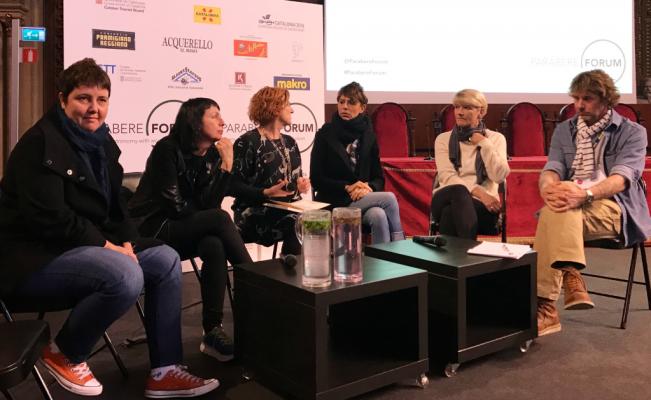IGCAT took part in the 3rd edition of the Parabere Forum, held on 5-6 March 2017 at the historical building of the University of Barcelona. As “an independent international platform featuring women’s views and voices on major food issues,” Parabere Forum “is committed to improving the state of gastronomy, food, nutrition, and agriculture by engaging leaders in various fields, from business and academia to politics and social issues.” The Forum focuses on how to overcome barriers and create new opportunities, as well as fostering the debate on innovative ideas.
2017 edition addressed the issue of Redefining Sustainability and featured interventions by “opinion leaders, food activists, international scientists, farmers, and top female chefs from five continents.”
On Sunday 5 March, Catalonia’s Deputy Director of Tourism, Carme Rubió opened the meeting thanking in particular Catalonia European Region of Gastronomy 2016 as a key partner for the event, stressing the significant contribution of its programme to the promotion of local gastronomy, as well as the boost it gave to tourism flows to the region.
Maria Canabal (France), Parabere Forum’s President and master of ceremony, introduced sustainability as the main theme of the meeting. Stressing the transversal nature of the concept, she highlighted that the main purpose of 2017 Forum was that of exploring how sustainability links to countless other topics such as education, creativity, arts, history, and social issues to name a few.
A first contribution to the discussion came from Dr. Afton Halloran (University of Copenhagen, Denmark) and focused on the socio-economic, nutritional, and environmental impacts of cricket farming in Thailand and Kenya. Italian chef Antonia Klugmann, presented then the model she adopted to ensure social, economic, and environmental sustainability of her countryside restaurant L’Argine a Vencò (Italy). Afterwards, Executive Chef at The Tasting Room restaurant, Margot Janse (South Africa), presented her charity project Isabelo – Feeding Hungry Minds, aimed to offer regular and highly nutritional meals to children in schools.
The meeting continued with a speech by Nikandre Kopcke and Roberta Siao (UK), founders of the roaming restaurant Mazí Mas in London conceived to help migrant and refugee women to capitalise on their cooking talent and make a sustainable livelihood out of it. A presentation by chef Nani Moré (Catalonia) followed, concerning the project MENU2020 aimed at transforming children’s diet in schools according to an economically competitive and socially responsible model.
The morning session concluded with former U.S. Army Engineer Officer Kimberly Young, who co-founded the for-profit social enterprise Rumi Spice, importing saffron from Afghan farmers and offering them a sustainable alternative to opium growing.
The afternoon session opened with a preview of the documentary The Goddesses of Food directed by the French journalist Vérane Frédiani, researching the struggles of women working in gastronomy, as well as the huge gender imbalance characterising the sector. The issues were further explored in a following debate, moderated by Australian journalist Joanna Savill and featuring interventions by several chefs from around the world.
On Monday 6 March, the conference started with the intervention of Sara Perez (Catalonia), founder of the sustainable winery Mas Martinet, followed by Maria Canabal’s speech on driving gender balance in kitchens. Afterwards, chef and activist Joshna Maharaj (Canada) presented her work in social gastronomy entitled The new face of chefs in 21st century.
Chef Samantha Aquim (Brazil), owner of the company Chocolate Q, reported on her efforts in promoting chocolate produced using only cocoa from the Amazon, while Dr. Lynn Gilmore, from Seafish Northern Ireland, addressed sustainability issues in the future of the seafood sector. Finally, UNHCR Officer Dr. Cristina Franchini (Italy) explained the relationship between gastronomy and sustainability in the context of forced migrations.
During the afternoon, 11 projects from around the world were presented in 5-minute sessions addressing different issues such as sustainability and gender equality in gastronomy. Finally, the owner of El Celler de Can Roca restaurant (Catalonia), chef Joan Roca concluded the meeting with an intervention on Cooking with a conscience.
Maria Canabal closed the two-day conference thanking all the speakers and the attending audience, announcing that 2018 edition of the Parabere Forum will focus on the theme of Edible Cities.
IGCAT considered its participation in the Forum as an extremely enriching experience, acknowledging the existence of common values underpinning both networks such as sustainability, multi-disciplinarity and the search for innovative solutions. Furthermore, it recognised and appreciated the significant role of Catalonia European Region of Gastronomy 2016 as a key partner of the event.
About IGCAT
IGCAT (International Institute of Gastronomy, Culture, Arts and Tourism) is an international network of experts in the fields of culture, arts, tourism and gastronomy. Collectively, we aim to empower local communities by guiding, facilitating and supporting leaders in cities, regions and cultural projects to understand the potential of their distinct food, culture, arts and sustainable tourism assets.
About the European Region of Gastronomy
The Regions of Gastronomy Platform and the European Region of Gastronomy Award aim to contribute to better quality of life in European regions, by highlighting distinctive food cultures, educating for better health and sustainability and stimulating gastronomic innovation. Candidate regions are invited to join a knowledge-exchange platform of European regions in order to further cross-border collaborations and develop shared initiatives.
To find out more information about the Parabere Forum, its members and 2017 speakers, please visit www.parabereforum.com.
7 March 2017
